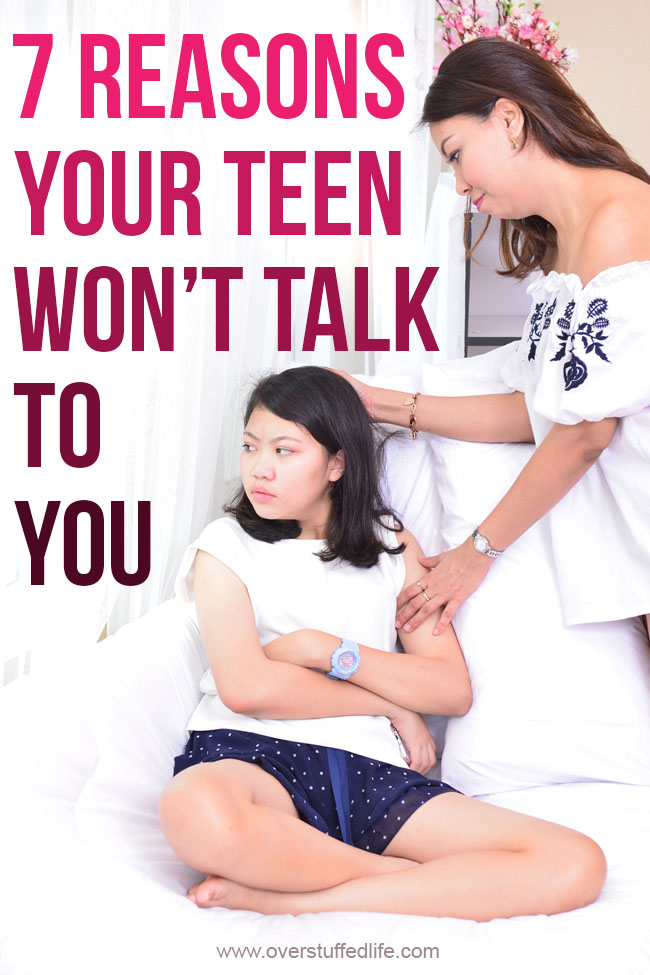7 Reasons Your Teenager Won’t Talk to You
Wondering how to get your teenager to talk to you after you’ve tried everything? Here are 7 reasons they don’t want to let you in.

As children become teenagers, they slowly stop talking to their parents. The adorable kindergartener who used to jump off of the school bus ready to tell you everything has now become a sullen 14-year-old who stays in her room and snaps at you when you ask a question.
This is rough for us parents. All we want is to be a part of our kids’ lives and to know and understand them. But these teenagers? They want nothing to do with mom and dad right now, or at least it may seem that way.
The truth is, your teenager really does want you in her life. She needs you in her life! She wants to share with you what’s going on in her world. She just doesn’t know how to navigate this weird space between childhood and adulthood, and she is pushing you away while trying to figure it out.
This pushing away is normal and natural, but we parents start to freak out about it! This freaking out often causes parents to do everything we can possibly think of to get our teenager to communicate with us. But many of the things we naturally do to get teens to talk actually push them away further!

7 things you might be doing to push your teenager away
1. You’re asking too many questions
To parents, asking questions is an obvious way to encourage communication.
To teenagers, it feels like they are constantly being interrogated.
“How was your day at school today?”
“Who are you texting?”
“How much homework do you have?”
“Why do you have three missing assignments?”
“When are you going to basketball practice?”
“Who is going to be there?”
You get the point.
Teenagers feel like they are being bombarded with questions from their parents all day long—and they aren’t wrong! It’s exhausting to have to answer questions constantly.
I did an experiment a couple years ago when my youngest had just turned 13 and was starting to shut me out. I really began to pay attention to how I spoke to her and I found that I communicated almost entirely in questions!
I decided that I would try to not ask any questions at all for an entire week. If I had to know something, I worked really hard to somehow turn it into a statement to get the answers I needed, but mostly I just didn’t ask questions.
I’m not going to lie, it was hard! But it was really eye-opening and helpful to me as a parent. I started to just tell her about my day when I picked her up from school instead of asking her about hers. I would just talk about random things instead of peppering her with questions about her homework and friends. And when there was something I wished she would talk to me about, I just said, “I know that you’re dealing with ____________. If you ever want to talk about it, I’m here to listen when you’re ready.”
After just a week, my daughter started opening up to me on her own. It was pretty amazing.
It’s not really feasible to never ask questions, so now I only ask them if it’s information I absolutely need to know. Ask questions sparingly and try to frame things as statements as often as you can.
It works.
2. You’re turning everything into a lecture
As parents, it’s our job to teach our children everything, and we take that job pretty darn seriously! Sometimes we take it so seriously that we feel we need to turn everything into a life lesson or lecture of some kind.
When my oldest daughter was 17, she said to me, “Oh my gosh, Mom! You need to stop turning every single conversation into a chore or a life lesson!”
It’s pretty normal mom behavior, but you have to admit it’s annoying. Sometimes it’s best to just chill out and let the teenagers learn their own life lessons without a lecture attached.
Besides, lecture is one of the most boring ways to learn anything! Teenagers tune out when they’re being lectured, and they will stop telling you anything if they think you’re just going to turn everything they say into another life lesson.
Find more creative ways to teach your kids the important lessons you want them to learn and they’ll love you for it.
3. You’re not validating their feelings
Teenagers can have some really big and often irrational emotions.
When parents observe these big feelings, they often discount them because they seem so ridiculous. This makes their teenagers stop sharing their feelings because they are immediately told to stop feeling that way.
A better way is to validate those big teenager feels—even when they seem completely crazy. When you let them know that it’s okay to feel whatever way they are feeling, they feel understood (even if you don’t understand exactly).
One of my daughters was really upset with a friend a couple weeks ago and ranted to me about it in the car. She told me about some of the issues she was having with this friend, and she even went so far as to say she hated her.
I admit, I thought she was completely overreacting. Just a few days before she and this friend were having a great time together at a basketball game (I observed with my own eyes!). But I also knew that I don’t see or hear everything that goes on between my kids and their friends.
So, instead of scolding her for being negative, I validated her feelings:
“Wow. Hate is a really big word. She must have really upset you to make you say that!”
More feelings came pouring out.
“I can see why that made you so mad. You must be really, really mad to choose staying home and doing chores over hanging out with her this afternoon!”
And then she shared more about the situation, and began to calm down and come up with her own solutions.
Instead of me telling her to stop being angry and shutting her down, she was able to work through her emotions on her own, with me as a listening ear.
Bonus: I learned more about her life by just listening and validating than I would have if I shut those feelings down.
Another time it is essential to validate feelings first is when your teenager is going through a breakup. It doesn’t matter what you think or feel about the situation, if you want them to communicate with you, they’ve got to feel safe sharing those emotions.
4. You’re not noticing the positive things they do
Parents can often get into perpetual teaching/lecture mode without even realizing they’re doing it. To kids, this feels like they can’t do anything right and that their parents are focused solely on everything they are doing wrong.
According to a Harvard study, employees need a 6:1 ratio of positive feedback to perform their best. That’s 6 positive pieces of feedback for every piece of negative feedback received. Why would teenagers be any different?
Notice the good they do. Praise them for being kind, thank them for making their bed, and hype them up for studying hard for their upcoming test. Find every reason you can to tell them you are aware of the good things they are doing.
And when you do need to give them some less-than-positive feedback, frame it as positively as you can. “Looks like you might need to clean up a bit in here,” is much easier to hear than, “Your room is a mess! Why can’t you ever keep it clean?”
Your relationship with your teenager will improve when you give them the positive feedback they crave.
5. You get mad before you hear the whole story
Teenagers can find themselves in some pretty sticky situations sometimes. They can make some really poor choices (those frontal lobes are still developing, after all!). They will break the rules you have made, whether accidentally or on purpose.
And they will definitely make you mad.
The trick is to not let them see just how mad you are until you are finished hearing them out.
Once you have heard the whole story you might not actually be so mad. Or you might be even more mad, but at least you have taken the time to listen. And listening is one of the most important skills to develop as a parent if you want your kids to talk to you.
Stay calm. Listen. Validate. Teach. Then listen some more. If there is a consequence that is needed in the situation, calmly talk to your child about what that consequence should be.
No teen is going to tell you the whole story if they know you’re just going to fly off the handle no matter what.
When you listen and react calmly, even when your child has done something incredibly stupid, they will trust you more. And when they trust you more, they won’t be afraid of telling you about the sticky situations they are sure to find themselves in.
6. You’re nagging them about everything
Your teenager knows what they need to do, and yet you still ask them to do it 20 times because they are just sitting there on their phone. Am I right?
Stop it! They only need to be told once, and the more you nag them about it, the less likely they are to do it.
Here are two good ways to end the nagging:
- Don’t tell your teen to do something. Instead, tell them why they should do it.
“Put your laundry away” can be reframed as “Here is your clean laundry. Putting it away will keep your clothes looking nice. When we leave it out, it’s likely to fall on the floor and get dirty again.”
This gives them a good reason to do the thing you are asking and you aren’t commanding them to do it. They feel like they have a choice. - Train yourself to only ask once. If your teen never does what was asked of them, the next time they ask you to do something, you tell them you can’t do it and why.
“Mom, can you drive me to the store?”
“I’m sorry, I can’t. You didn’t put your laundry away when I asked you to do it this morning, so I won’t be able to take you.”
Just a few times doing this will teach them to do what you ask right away.
Taking away the nagging leaves more room for more important conversations. Plus your teenager is more likely to talk to you when they don’t feel like they have stuff to do looming over their heads all the time.
7. You don’t trust them to make good decisions
Give your kid more trust than you think they necessarily deserve. If they know you trust them, they will do whatever they can to keep that trust.
But if they think that you don’t trust them and you have unnecessary rules set up because of that, they will probably go behind your back and do it anyway. And they won’t tell you about it.
Teens value your trust. They want to keep it. If they don’t have your trust anyway, why bother keeping the rules? You’re not going to trust them either way, so what’s the point? Might as well do what they want.
Have a conversation and explain what you expect from them (not in a lecture!) when they are in certain situations. Talk about the reasons behind your rules. And then trust that they will keep those rules.
If they end up breaking the rules (and they will), see #5. Stay calm, listen to them, and work together to come up with an appropriate consequence.
If they keep the rules (and they will), see #4. Praise them for making a good decision.
A kid who knows his parents trust him will trust his parents with his feelings.
I am not perfect at these things. In fact, I just had a pretty big argument with one of my daughters the other day because I was nagging her too much about her grades. I wasn’t listening to the reasons why she was struggling with them. I wasn’t giving her enough positive feedback about the classes she was doing well in.
I realized my mistakes and I started over. We ended on a good note, and I was able to really listen and understand what her issues were in that particular class. Once I listened and understood, I was able to help her.
If you want your kids to talk to you, step back and give them the space they need to share. Don’t worry if they don’t tell you everything, because they won’t. But they will sure tell you a lot more when they know you’re listening, validating, and trusting.
I sat down and talked with my friend Kristina about these 7 things on her YouTube channel. We had a great conversation and expounded a lot more about how to get those teens communicating! You can watch it here: 7 Ways to Get Your Teenagers Talking.






